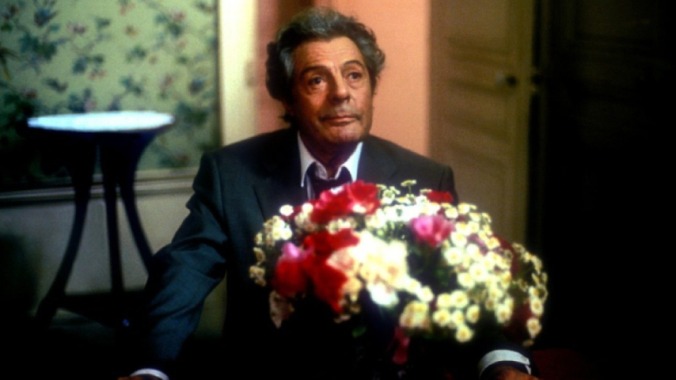Film School: The Late Career of Marcello Mastroianni
Subscriber Exclusive

Welcome to Film School! This is a column focused on movie history and all the stars, filmmakers, events, laws and, yes, movies that helped write it. Film School is a place to learn—no homework required.
However hard a writer might try, it’s impossible to do justice to the career of Marcello Mastroianni in a few thousand words.
It may have taken him until the comparatively mature age of 35 to become a big star, but once he hit those heady heights, he never stopped working—by the time of his death, at the too-young age of 72, he’d made almost 150 movies. Over this month of Film School, we haven’t even had time to dive into his five films with long-term partner Catherine Deneuve, or his dalliances with the very Italian genres of giallo and poliziotteschi, or the handful of English-language features in which he appeared during the ‘60s and ‘70s. The man was too damn prolific!
And unlike many actors blessed with a career that spanned decades, there was no drop-off in quality as Marcello Mastroianni grew older. As we’ve discussed already, it’s not that every film he made was a work of art (in some cases, far from it). But during the final decade or so of his life, Mastroianni was as productive as ever, and just as committed to seeking out interesting projects and developing new fruitful artistic partnerships.
One of the most fruitful was with celebrated Greek director Theo Angelopoulos. Angelopoulos had never worked with a well-known actor before, and was dubious about casting Marcello Mastroianni in his pathos-laden arthouse classic, The Beekeeper.
“In my eyes he was a cinema icon, but he was someone who, so I thought, could only play either comic parts or in Fellini’s 8½. Certainly not the kind of person I needed for The Beekeeper,” Angelopoulos said in an interview with Dan Fainuru. But he saw him anyway, just to appease screenwriter Tonio Guerra (who’d worked on a host of Mastroianni films), and as he did, “I noticed the expression on his face was changing in the most amazing way. At certain moments, I had the feeling his eyes were getting wet. I was almost speechless and realized he was the actor I was looking for.”
Marcello Mastroianni (who performed in Italian, and then dubbed himself in Greek) was moving and widely acclaimed in the role of an aged beekeeper alone in the world. He would go on to work with Angelopoulos again on The Suspended Step of the Stork.
The year after The Beekeeper, Mastroianni made another highly praised film with a director from outside of Italy. Set in the early 1900s, Dark Eyes saw Mastroianni play Romano, a middle-aged Italian adrift in his marriage to a rich society lady. Talking with a friendly Russian man he meets on a cruise, he tells the tale of his love affair with a young woman he encounters at a health spa—a tale that has an abundance of twists and turns.
-

-

-

-

-

-

-

-

-

-

-

-

-

-

-

-

-

-

-

-

-

-

-

-

-

-

-

-

-

-

-

-

-

-

-

-

-

-

-

-








































